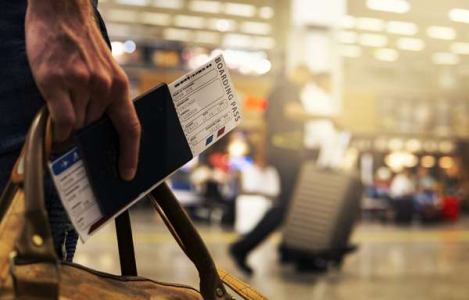Planning a European Holiday? You might need a special travel permit
Dreaming of strolling through the romantic streets of Paris or taking in the breathtaking sights of the Swiss Alps? If a European getaway is on your bucket list, you'll want to pay attention to some new travel requirements that may impact your future plans.
Starting in 2024, Australians heading to Europe must apply for a special permit to travel through 30 European countries. The European Union has introduced a new system called the European Travel Information and Authorisation System (ETIAS) to strengthen security measures and streamline visitor entry requirements.
So, what does this change mean for your European travel plans, and how can you ensure that your dream holiday goes off without a hitch?

Read on to learn everything you need about the new ETIAS system and its effect on your future European escapades.
By implementing ETIAS, the EU aims to strengthen security and provide a more streamlined and uniform entry process for visitors from visa-exempt countries, such as Australia.
The authorisation is connected to your passport, so it's essential to ensure that your passport remains the same during the application and your travels.
While having an ETIAS authorisation is necessary for entry, it doesn't guarantee admittance to any participating European nations. You'll still need to meet the specific entry requirements at the border of each country you visit.

When applications become available, you must submit them through the official ETIAS website. To apply, you must have a valid travel document, such as a passport that won't expire within three months of your trip and is no more than ten years old.
The ETIAS application process will involve providing personal details like your name, contact information, intended length of visit, and declaring any criminal history.
Most applications will only take a few minutes to process, but some may take up to four days, so it's crucial to allow ample time for your application to be approved before your holiday.
However, the authorisation only covers short-term stays, granting you up to 90 days of travel within any 180-day period in participating countries.
You must have a valid ETIAS authorisation throughout your visit and respect these time limits.
While not completely free, the application fee for ETIAS is quite reasonable at €7 (approximately $11.22 AUD, subject to fluctuation due to exchange rates).
Individuals aged under 18 or over 70, as well as family members of EU citizens, are exempt from this fee.

If you’re planning an upcoming European holiday in 2024, it's crucial to stay informed about the ETIAS requirements in order to ensure a smooth and enjoyable adventure.
By keeping these requirements in mind and staying up-to-date on the latest rules and regulations, you'll be well-prepared to immerse yourself in the remarkable culture, cuisine, and history that awaits you in Europe!
In light of the ever-changing travel landscape, what strategies and tips do you employ to stay updated on travel requirements and regulations, ensuring smooth and hassle-free travel experiences? Share your insights and learn from others to make our future adventures truly unforgettable!
Starting in 2024, Australians heading to Europe must apply for a special permit to travel through 30 European countries. The European Union has introduced a new system called the European Travel Information and Authorisation System (ETIAS) to strengthen security measures and streamline visitor entry requirements.
So, what does this change mean for your European travel plans, and how can you ensure that your dream holiday goes off without a hitch?

Travellers from Australia planning to visit 30 European countries must obtain a specific travel permit. Image by Anna Shvets from pexels
Read on to learn everything you need about the new ETIAS system and its effect on your future European escapades.
Why is ETIAS being implemented?
Given the current global climate, the European Union has recognised the need to enhance safety measures in its member countries.By implementing ETIAS, the EU aims to strengthen security and provide a more streamlined and uniform entry process for visitors from visa-exempt countries, such as Australia.
How will ETIAS affect my travel plans?
If you plan to visit one or more of the 30 European countries in the ETIAS system, you must obtain travel authorisation before your trip in 2024.The authorisation is connected to your passport, so it's essential to ensure that your passport remains the same during the application and your travels.
While having an ETIAS authorisation is necessary for entry, it doesn't guarantee admittance to any participating European nations. You'll still need to meet the specific entry requirements at the border of each country you visit.
How do I apply for my ETIAS authorisation?

The ETIAS application involves providing personal details such as name, contact information, intended length of visit, and criminal history. Image by JoshuaWoroniecki from pixabay
When applications become available, you must submit them through the official ETIAS website. To apply, you must have a valid travel document, such as a passport that won't expire within three months of your trip and is no more than ten years old.
The ETIAS application process will involve providing personal details like your name, contact information, intended length of visit, and declaring any criminal history.
Most applications will only take a few minutes to process, but some may take up to four days, so it's crucial to allow ample time for your application to be approved before your holiday.
Do I need to apply for ETIAS every time I travel to Europe?
The good news is that once you've received your ETIAS travel authorisation, it remains valid for three years or until your linked passport expires (whichever comes first).However, the authorisation only covers short-term stays, granting you up to 90 days of travel within any 180-day period in participating countries.
You must have a valid ETIAS authorisation throughout your visit and respect these time limits.
What costs are involved with applying for ETIAS?
While not completely free, the application fee for ETIAS is quite reasonable at €7 (approximately $11.22 AUD, subject to fluctuation due to exchange rates).
Individuals aged under 18 or over 70, as well as family members of EU citizens, are exempt from this fee.
How does this change affect travel to the UK?
Since the UK is not part of the ETIAS system, travel rules for Australians visiting the UK remain unaffected. However, UK citizens visiting Europe must also undergo the same application process as Australians.
Key Takeaways
- Australians looking to enter Europe starting in 2024 will need to apply for a new special permit through the European Travel Information and Authorisation System (ETIAS) to travel through 30 European countries.
- The ETIAS system has been implemented for citizens of otherwise visa-exempt countries.
- Most applications will take 'minutes' to process after being lodged, but some could take up to four days.
- An ETIAS travel authorisation is valid for three years or until the passport you applied with expires, for short-term stays up to 90 days within any 180-day period, with an application fee of €7 (or $11.22 AUD).
If you’re planning an upcoming European holiday in 2024, it's crucial to stay informed about the ETIAS requirements in order to ensure a smooth and enjoyable adventure.
By keeping these requirements in mind and staying up-to-date on the latest rules and regulations, you'll be well-prepared to immerse yourself in the remarkable culture, cuisine, and history that awaits you in Europe!
In light of the ever-changing travel landscape, what strategies and tips do you employ to stay updated on travel requirements and regulations, ensuring smooth and hassle-free travel experiences? Share your insights and learn from others to make our future adventures truly unforgettable!
Last edited by a moderator:








